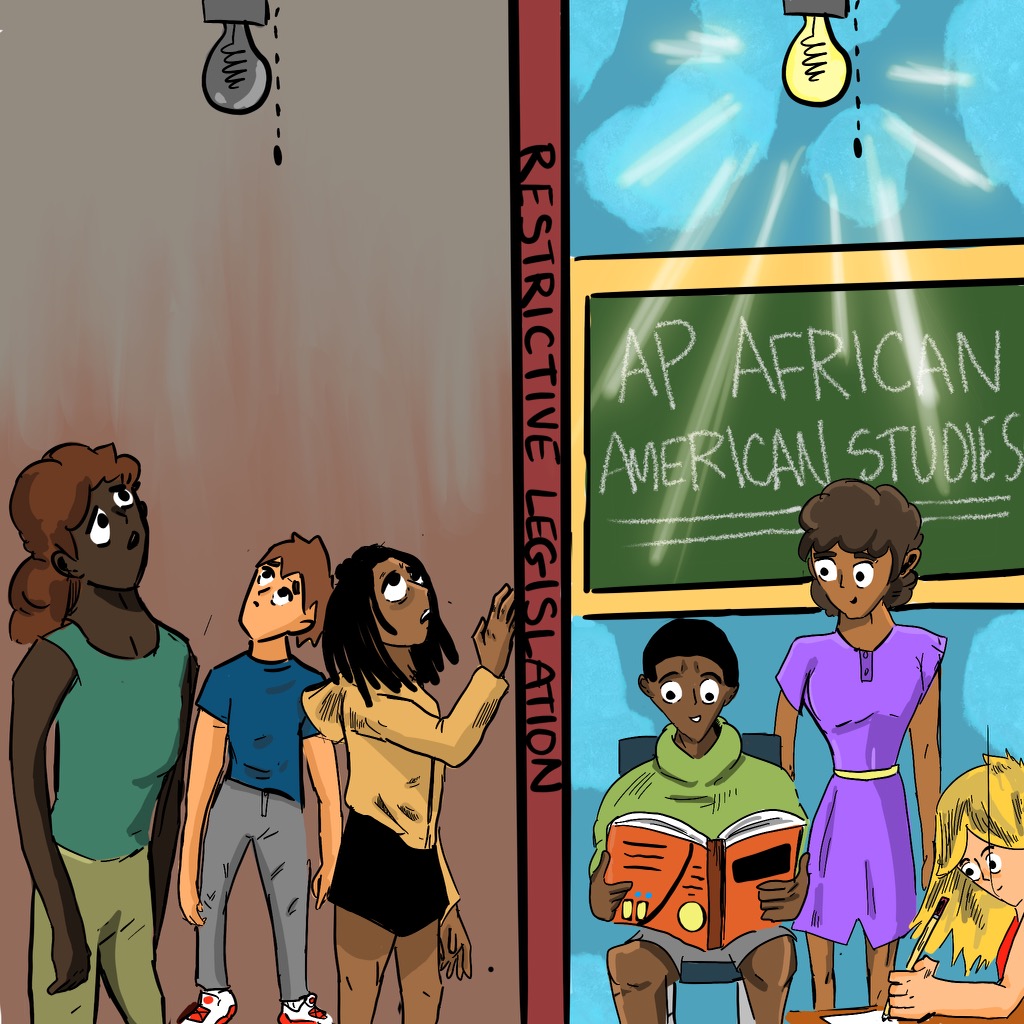A group of students stand in the darkness, separated from a classroom illuminated in the light of knowledge. The Florida Board of Education motioned to ban the College Board’s Advanced Placement African American Studies course, which Editor-in-Chief Molly Harwell feels was an unfair censorship of American history that is detrimental to students. “While the implementation of the AP African American Studies course at Cedar Shoals feels like a win, the fact remains that many legislator’s priority was to ensure students are kept in safe, sheltered bubbles, instead of providing them with a comprehensive education,” Harwell wrote. Illustration by Sam Harwell
The banning of AP African American Studies serves as a form of censorship in schools and takes away students’ academic freedom.
It’s no secret that the history of the United States is complicated. As much as it’s built upon the principles of liberty and justice, it has also been built upon racism, division and hatred. Fortunately, students have long had the access to learn about the complexity of the country.
In the present day however, lawmakers are trying to limit that access.
In January, Florida Gov. Ron DeSantis and his administration rejected the College Board’s newest Advanced Placement pilot program, AP African American Studies, a course that “reaches into a variety of fields—literature, the arts and humanities, political science, geography, and science—to explore the vital contributions and experiences of African Americans,” according to the College Board.
“(AP African American Studies) reaches into a variety of fields—literature, the arts and humanities, political science, geography, and science—to explore the vital contributions and experiences of African Americans.”
— College Board,
However, DeSantis stated that the course violates Florida state law and isn’t historically accurate, according to a Jan. 19 article published by the New York Times.
This decision came shortly after DeSantis signed the Individual Freedom Act, more commonly known as the Stop WOKE Act, in April 2022 to restrict how the topic of race could be discussed in schools and workplaces in Florida.
These two examples are major instances of elected officials trying to censor history for students and limit students’ academic freedom.
While it’s easy label these issues as only Florida problems, the Georgia State Senate already enacted anti-Critical Race Theory legislation in April 2022, as evident in Georgia House Bill 1084.
The bill, also known as the Protect Students First Act, will “prohibit the use of curricula that addresses the topics of slavery, racial oppression, racial segregation, or racial discrimination,” without influence of personal beliefs, as outlined in Section 1, Article 6.
Sound familiar?
In the Clarke County School District, however, the course is being embraced and many view the ban as a negative effect on students.
“I view (the ban) as a form of censorship, and usually when society takes those action steps to mute people, it only motivates those who have a passion for the subject matter to see their voices, let their voices be heard,” Clarke Central High School Principal Dr. Swade Huff said. “As a minority, I feel like it’s a form of whitewashing, and it doesn’t work because the history is the history and the bottom line is, the story will get told.”
“I view (the ban) as a form of censorship, and usually when society takes those action steps to mute people, it only motivates those who have a passion for the subject matter to see their voices, let their voices be heard. As a minority, I feel like it’s a form of whitewashing, and it doesn’t work because the history is the history and the bottom line is, the story will get told.”
— Dr. Swade Huff,
Clarke Central High School Principal
The AP African American Studies course at Cedar Schoals High School, taught by CSHS social studies department teacher Montu Miller, which is open to students in 9-12 grades and counts as a social studies elective credit, is vital for students, as it allows many to see themselves outside of a history curriculum that only touches on Black history on the surface level.
“AP African American Studies is filling in a lot of the gaps that U.S. history doesn’t, so I think it impacts students because it just gives them a (greater) depth of knowledge, especially with most of my classes being African American, being Black,” Miller said.
While the implementation of the AP African American Studies course at Cedar Shoals feels like a win, the fact remains that many legislator’s priority was to ensure students are kept in safe, sheltered bubbles, instead of providing them with a comprehensive education, which Miller takes issue with.
“They don’t want this knowledge to be taught to kids because it opens up to the kids to understand their legacy, and if they understand their legacy, then I feel like they push harder forward,” Miller said.
By trying to cover up and “protect” the complex history of the country, it is just giving way for issues like racism, homophobia and xenophobia to persist, especially within our own schools.
As a young American woman, I, along with my peers, deserve the right to learn about the history of our country, even if it may be uncomfortable at times.
We should have access to a complete education, one that teaches us how to never forget how we got to where we are today. One thing that lawmakers must realize is that if we forget our history, we are doomed to repeat it.
